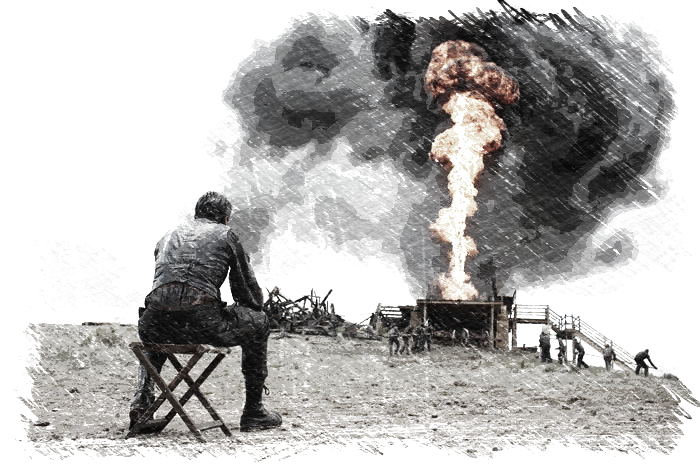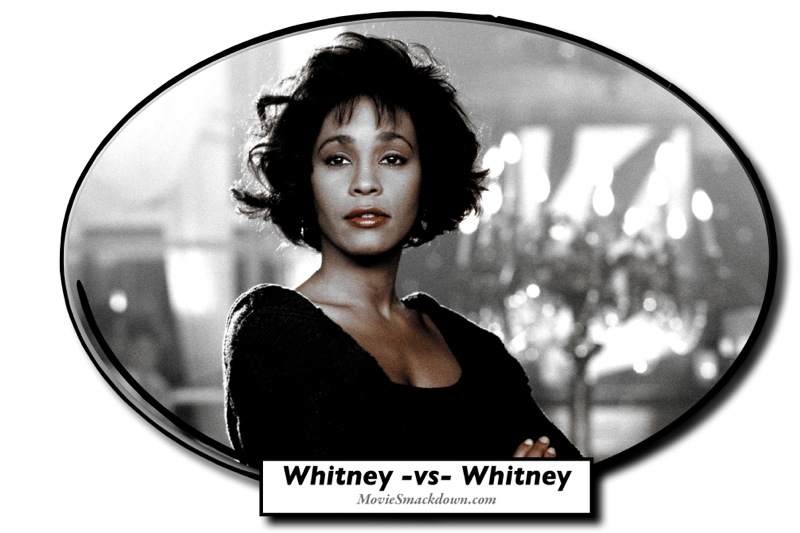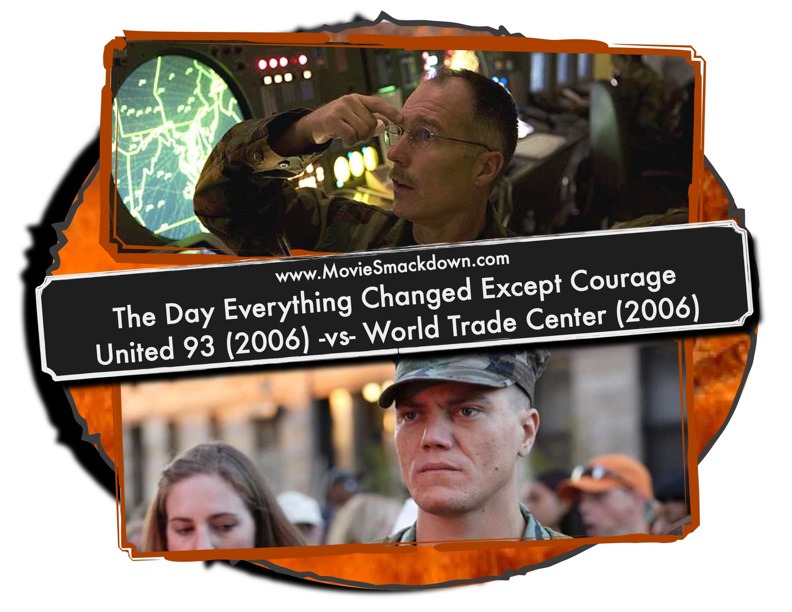
 The Smackdown
The Smackdown
Determining the best film ever made is much like asking God to name his favorite movie. It’s an impossible question, but one The Academy (a sort of god) answered when it named “Citizen Kane” as the best film ever made. Often people call “Citizen Kane” the ultimate tale on America’s character, dramatized by a reporter piecing together the puzzle that was newspaper mogul Charles Foster Kane. But now, more recently, P.T. Anderson brought us Daniel Plainview, the ruthless, smooth-talking oilman of “There Will Be Blood” — a film surprisingly similar in its epic exploration of America’s character. So today, we crack open a bottle of pinot noir, light a Cuban cigar, scoop at the sevruga caviar, and wax philosophical like The Academy. For the sake of a fair fight, though, let’s not up the stakes as high as a decision as to whether “Citizen Kane” could fall as the gold standard of the film medium. Instead, let’s put two fighters in the ring together — Charlie Kane and Danny Plainview — and ask which one exists in the superior film.
[singlepic id=711 w=320 h=240 float=right]
The Challenger
P.T. Anderson represents a bit of an anomaly in American film. Here’s a young guy whose managed to direct four films that individually possess more skill and talent than most A-list director’s entire filmographies. “There Will Be Blood” is his latest — the tragic, enrapturing tale of Daniel Plainview. Plainview is a wannabe silver prospector made black gold businessman after he strikes oil by chance while searching for silver. When Plainview gets word of a possible ocean of oil beneath the small, dwindling town of Little Boston, he sets out to build his oil empire with ruthless abandon. Controlled is a word best describing this movie because — like his protagonist — Anderson executes an uncanny amount of control over his craft. Anderson slaves every visual, every line of dialogue, every plot turn to Plainview’s fall from grace and produces a modern American epic in the process.
[singlepic id=1 w=320 h=240 float=right]
The Defending Champion
Orson Welles’ “Citizen Kane” revolutionized film, creating a legacy present in every movie since. When loved and reviled newspaper mogul Charles Kane dies, his last word is “rosebud.” Â With this word as his only lead, a faceless reporter heads out to speak to the people who knew Kane most, trying to solve the mystery of what drove this mysterious man. Like the audience, the reporter follows the tale of a great, jovial innocent youth driven into loneliness and misery by his own insatiable appetite. Eerily ruminative, “Citizen Kane” is a warning to post-Depression America about the threat of excessive capitalism and greed, bringing out themes in a visual way few films have since.
The Scorecard
I recently got into a friendly debate with a close friend about “There Will Be Blood” and its quality. Of course, I couldn’t discount its quality. However, having only seen it once, I promised him I would check out the film when I had some downtime since he seemed to be building his very own church to the film’s sanctity. That promise lead to this review.
Let be outright and proceed from there: “There Will Be Blood” is clearly a better, more resonant film than “Citizen Kane” could ever hope to be. Â Should people consider “Citizen Kane” the best film ever made, then I suppose it so follows with “There Will Be Blood”…
Most of the time when we do a Smackdown, we take into account the factor of time and technology. Â It’s hard to compare “Star Trek II: The Wrath of Khan” or Abram’s “Star Trek” when the technology in both — the cinematic techniques — have so vastly improved between films. Even films such as crime thrillers or horror flicks benefits from evolution in craft and technology.
However, once can safely watch “Citizen Kane” and “There Will Be Blood” back to back and say that for both Welles and Anderson, the same opportunities were essentially present. This only proves how amazing”Citizen Kane” is, since it introduced techniques that are only still now being harnessed in modern cinema.
But these films are so comparable because their hearts – story – never changes. These films are about character, about men — and both are the stuff of tragic tales told centuries ago.
So what makes “There Will Be Blood” better? Â First, the acting.
As Anderson showed with “Magnolia” and “Punch-Drunk Love”, he can seemingly take any actor and make them into something more than their art. He did it with Tom Cruise, Julianna Moore, and Adam Sandler. All are good actors in their own right, but all transformed into stunning characters under Anderson’s directing. Teaming Anderson with Daniel Day-Lewis was an almost predestined move, a nearly unfair teaming of master with master to produce one of the most complex characters ever to grace film: Daniel Plainview.
And that’s the thing: “Citizen Kane” and “There Will Be Blood” thrive by their characters. Both are about the downfall of potentially great men. Kane is the All-American socialite, a relic of the Roaring Twenties bringing the style all the way up to the Forties with his sensationalized newspapers, singer love affairs, and folksy political charm. Â Plainview is a smooth-talking businessman who’s in it for a buck.
As Kane, Welles plays it well, but almost always a tad too hammy. There’s a certain lack of nuance with Kane’s character until the very end of the film, when Susan leaves him and Kane thrashes about her expensive bedroom. And with such a larger than life character as Kane (loosely based on William Randolph Hearst), I’d normally understand. But in typical Welleian acting and directing style, there’s a feeling of excess in not only his own performance, but those of the supporting characters. Susan especially comes off as a whiney, 2-D brat with very little to offer except for her child-like tantrums.
“There Will Be Blood” showcases the same nuanced characterizations that Anderson’s films are known for, pinched with the slight hint of hyperbolic flair. Plainview is at the same time charismatic and disgusting. A sadist, and a optimist. What’s so enrapturing about Plainview — what keeps the audience hooked — is that you never can quite put together who exactly Plainview is. Â As soon as you have a grasp, things shift. Â He shows a genuine fondness for his adopted son. He cradles him. He abuses him. He seems overeager to accept his long lost brother despite revealing that he hates people. Oddly enough, Plainview is very much one of Susan’s unsolvable puzzles on the floor of Xanadu — a puzzle Welles meant to symbolize Kane but more aptly symbolizes Plainview.
There’s also a question of sympathy. Both these men have the same flaw: they are ruthless “consumers.” Ironically, for two men who sell product, they themselves are trapped by their own needs to consume all around them — to own, dominate, and profit. Â And underneath this, there seems to be this self-hate masked by an advertised appearance. One wonders if Kane only marries Susan in order to erase the quotation marks around “singer” in the newspaper article that exposes their affair. Â One wonders if Plainview immediately saw a “cute face” in H.W. that would assist him in acquiring land. These men are obsessed with image — with advertising themselves — in order to satiate their greed. The cost, underneath, is their happiness and self-love. They can’t tolerate themselves.
But “There Will Be Blood” explores this flaw more skillfully then “Citizen Kane.” It’s a simple moment, one where Daniel Plainview realizes his desire to have family got him duped by an man posing as his long lost brother. Â After killing the man, Plainview opens his long lost brother’s diary and weeps uncontrollably as he’s reminded of lost family — like the adopted son he abandoned. Next — in one of the film’s more gut-wrenching scenes — Plainview’s guilt brings him to get baptized by his antagonist, the false prophet Eli Sunday. Â From this point forward, we are hooked emotionally and can now watch with pity as Plainview falls — a thing “Citizen Kane” only gives us in its final moments. Â With Plainview, we are given time to fear how far he’ll fall in order to hits the ground.
And that’s perhaps because of the intent of these films. Â “Citizen Kane” works more as a warning and critique of the American ideal and dream. Come to America, get rich, have fun, find liberty. Â Welles critiques that and leaves the audiences with the morality of “rosebud,” showing that even someone like Kane longs for those lost days of innocent childhood. It’s essentially a bittersweet ending.
On the other hand, “There Will Be Blood” plays as an epitaph to the American dream.  There’s no warning to be had — it’s over. Anderson isn’t warning us of the corrupt potential of the American Dream.  He’s mourning that it’s no longer a potential; that we have fallen under the weight of the insatiable dollar sign and now live in the caustic fallout.
And what a fallout: family, prosperity, and sanity are the cost of the dollar in “There Will Be Blood.” Â Where is that same depth in “Citizen Kane”? Â Where do we feel? Â Is it when Kane’s first bitch-of-a-wife leaves him? Â Or is it when his little whiney starlet leaves him? Â When Kane loses, he loses something we already disliked. Â Something we would never want in the first place. Â Plainview, on the other hand, succumbs to his greed and is left not only lonely, but mad.
Also, reflecting back on the note of sympathy, it helps a character when he has a vile, and worthwhile antagonist. No more is this true then when your main character himself is inherently dislikable. Even the most hardened humanitarian would side with Saddam Hussein if he’s fighting Satan. Â Kane exists in a sort of vacuum, the nearest thing to an antagonist being a corrupt governor. Â Now true, Kane himself is his own enemy. Â This is the same for Daniel Plainview. Â But it is hard to root for someone against themselves — it’s a highly cerebral effort. What works in “There Will Be Blood” is that Anderson creates an antagonist — Eli Sunday — who can “team up” with the enemy inside Plainview, bringing out into tangible conflict the demons that threaten to destroy Plainview. The film’s most riveting scenes, and most emotional and thematic, are between Plainview and Sunday. Â These are scenes, sadly, that “Citizen Kane” lacks altogether unless Welles would’ve had Kane arguing with himself in a mirror (which I wouldn’t put past Welles honestly).
Lastly, there’s something to be said about mastery of the medium. Welles is no doubt a master. Â Anderson, however, shows something truly special in “There Will Be Blood.” Â It’s the little touches that don’t rely on technology or craft but just intelligence that make this film so special. Like the multiple meaning of the word “blood” in terms of oil, life fluid, and family. Or the symmetry of H.W. discovering the oil in Little Boston, his left foot just dipped in it as he walks. Then when Plainview mines his own sort of oil from the crushed skull of Eli Sunday, his own left foot just dips into the blood just like his now estranged son. It is also, fittingly, the only scene explicitly showing blood and fulling the promise of the film’s title.
Or how about the reference to an orphan in a basket in the desert? A clear reference to Moses, and a lovely play on the religious dynamics the entire film plays with as Plainview worships the oil more than family, friends, or God himself. Even more, that the one character capable of destroying Plainview — his adopted son — is the character who goes deaf and is now immune to his father’s smooth-talking sales pitches.
Now sure, we have the many side of Kane symbolized in the lovely multi-mirror shot at the film’s end. But the skill and breadth of what Anderson does in “There Will Be Blood” deserves another type of respect altogether, producing a film that delivers again and again in different ways each time you watch it.
The Decision
Go ahead. Burn my house down. “There Will Be Blood” outsells “Citizen Kane,” introducing a more compelling “superman” whose fall resonates both intellectually and emotionally. I hold twenty years from now, as scholars again try to decide what film most mastered the medium, that they will have no choice but to conclude “There Will Be Blood.”




1941’s Citizen Kane Is My Favorite Film Of All Time.
TWBB is not traditionally plot-driven, but that hardly means it lacks a story. It tells many stories quite skillfully and simultaneously, layering them upon each other with considerable subtlety and intelligence. As a narrative structure, it is certainly modernist, and like a lot of Anderson’s work, it has a very kaleidoscopic, mosaic-like quality — almost impressionistic, but with extremely precise detail. Music and dialogue overlap editorial cuts and shifts in slightly surreal ways, giving the movie a bizarre organic unfolding flow; time sweeps forward at unexpected moments, and the full vision of the movie doesn’t come into complete, appreciable focus until it is finished (and most people need to see it a couple times before they fully appreciate it, because it’s a lot to absorb).
If most films function like a live-action comic-book or graphic novel, TWBB functions more like a giant, single, panoramic painting. It’s breathtakingly beautiful, but you have to really step back, take the whole thing in, meditate on it, and process it on a few different levels before you reach a full appreciation for what’s been accomplished. Doing so is extremely rewarding. It is a very moving film, but certainly not at all sentimental, and its highly apocalyptic emotional resonance is, to me, utterly unique. I have never seen another movie quite like TWBB. The subject matter, characterization, cinematography, thematic scope, and emotional impact are all highly unique and make for a very compelling combination.
(I was rather disappointed by Anderson’s more recent film The Master, though I suppose TWBB is a very hard act to follow.)
Citizen Kane Is My Favorite Film.
It’s true ‘There Will Be Blood’ is the greatest film ever (and DDL being the greatest actor for screen ever)….if Kubrick were alive today he would’ve retired with the notion that “someone finally surpassed the master into grandmasterdom!” End …no more said!
LMAO
I watch it at least once a year or so…it tickles me still. I find it remarkably smart and stylish and modern.
Over ten years ago for me. I knew I was supposed to love it and put it above all else in cinema but I just didn’t feel it.
January. I was bored, it was hot, and I had nothing else to do just then.
I give some serious props for going against the grain and willingly bringing on the message board tar and feathering that is always going to come with such a conclusion.
Just curious — when was the last time anyone watched CK?
Do you like chocolate flavour? I found TWBB a boring, misogynistic twaddle.
I met a friend of mine after a rough cut screening of Albert Brooks’ DEFENDING YOUR LIFE. I asked how it was and he said, “There are moments of genius.” As far as I am concerned PT Anderson hit it out of the part with Hard 8 and Boogie Nights, but Magnolia meanders and loses its focus. For me, the biggest difference between Citizen Kane and There Will Be Blood (if we must) is that I was never bored during Citizen Kane. You could say that Mr. Wells was overacting but he was in the style of the day. Actually, I think the scenery got pretty well chewed up in There Will Be Blood. The greatest movies (just my opinion) always have, in addition to great acting and sets etc… a compelling story. Story trumps almost anything else. PT Anderson is not alone (are you out there Charlie Kaufman) in bringing us his gems, only to stop in the middle of the piece to say …. Look how clever I am. Beau, you might be right. It’s only an opinion, but mine is with the masses on this one. Brian.
The Godfather is the best movie of all time. Citizen Kane is in the top 5, but I am delighted There Will Be Blood is being given the critical respect it deserves — it was easily the best movie of the last five years, and maybe longer. And if you don’t agree with me, then I will drink your milkshake.
Aw, c’mon Sherry, let him have it. Fire when ready!!
Hey, Beau. Finding it a little lonely out there on that limb? Just wondering. I’ll just stay here on the ground out of the fray.